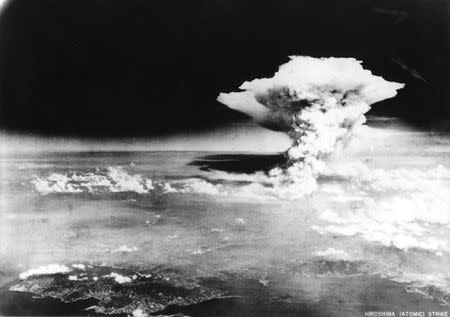Hiroshima survivor: Obama apology would ease my suffering
By Minami Funakoshi HIROSHIMA (Reuters) - Barack Obama, the first sitting U.S. president to visit Hiroshima, will lay a wreath on Friday at the site of the world's first atomic bombing, which killed thousands instantly. Following are comments from people in Hiroshima, which was devastated on Aug. 6, 1945. EIJI HATTORI, 73, SURVIVOR "I want Obama to say 'I'm sorry.' If he does, maybe my suffering will ease." Hattori's parents and grandparents, who sold rice near where the bomb fell, all either died that day or in the years that followed. He has been told he was riding a tricycle when the bomb exploded, and now has three types of cancer. "If Obama apologised, I could die and meet my parents in heaven in peace. I can tell them it happened." KENJI ISHIDA, 68, TAXI DRIVER "A sitting U.S. president visiting Hiroshima is just the first step. We're still 10 years from the possibility of a president issuing an apology." Born two years after the bomb was dropped, Ishida remembers growing up with bomb survivors whose skin was scarred. "Japan has to apologise for Pearl Harbour, too, if we're going to say the U.S. must apologise ... That's not possible, given the countries' current situations. In America, people say the war ended early because they dropped the atomic bomb. If a president apologised for this, it would raise hell in the U.S. "We can't tell North Korea not to have nukes when the U.S. has them, but the U.S. developed them first ... It's not possible to get rid of nuclear weapons when they're being used as deterrence." MIEKO KOIKE, 67, HIROSHIMA RESIDENT "If Obama were to apologise as the representative of the United States, then Japan's military needs to apologise too ... The best thing is for both (Obama and Japanese Prime Minister Shinzo Abe) to apologise together. "I want Obama to visit the (memorial) museum, I want him to feel the shock ... It's not something humans would do. The bomb harmed so many innocent civilians, especially the weak, like women and babies." TAXI DRIVER, IN HIS 70S "For 70 years, my family has been fighting with the risks of radiation." The driver, who was born before the bomb fell and declined to give his name, said his parents were irradiated. His younger siblings, born after the bombing, fear they may one day show symptoms. "In all the years I've been alive, I've never once attended the memorial on Aug. 6 ... My family avoids thinking about it as much as possible, we're trying so hard to forget. "Many people in Hiroshima feel the same way." (Writing by Elaine Lies; Editing by Paul Tait)



